Postmaster General of the United Kingdom
| Postmaster General of the United Kingdom | |
|---|---|
|
| |
 | |
| Style | Postmaster General |
| Appointer | Prime Minister of the United Kingdom |
| Precursor | Master of the King's Post |
| Formation | 1517 |
| First holder | as Master of the Kings Post |
| Final holder | John Stonehouse |
| Abolished | 1969 |
| Succession | overseen by the Secretary of State for Business, Innovation and Skills |
The Postmaster General of the United Kingdom was a Cabinet-level ministerial position in HM Government. Aside from maintaining the postal system, the Telegraph Act of 1868 established the Postmaster General's right to exclusively maintain electric telegraphs. This would subsequently extend to telecommunications and broadcasting.
The office was abolished in 1969 by the Post Office Act 1969. A replacement public authority governed by a chairman was established under the name of the "Post Office (that part subsumed by Royal Mail)". The position of "Postmaster General" was, with reduced powers, replaced with "Minister of Posts and Telecommunications"; since which most such regulation instead has been delegated to the Secretary of State for Culture, Media and Sport however the present-day Royal Mail Group was overseen by the Secretary of State for Business, Innovation and Skills prior to flotation.
History
In England, the monarch's letters to his subjects are known to have been carried by relays of couriers as long ago as the 15th century. The earliest mention of Master of the Posts is in the King's Book of Payments where a payment of £100 was authorised for Tuke as master of the posts in February 1512.[1] Belatedly, in 1517, he was officially appointed to the office of Governor of the King's Posts, a precursor to the office of Postmaster General of the United Kingdom, by Henry VIII.[2] In 1609 it was decreed that letters could only be carried and delivered by persons authorised by the Postmaster General.[3]
In 1657 an Act entitled 'Postage of England, Scotland and Ireland Settled' set up a system for the British Isles and enacted the position of Postmaster General. The Act also reasserted the postal monopoly for letter delivery and for post horses. After the Restoration in 1660, a further Act (12 Car II, c.35) confirmed this and the post of Postmaster-General, the previous Cromwellian Act being void.
1660 saw the establishment of the General Letter Office, which would later become the General Post Office (GPO).[3] A similar position evolved in the Kingdom of Scotland prior to the 1707 Act of Union.
The office was abolished in 1969 by the Post Office Act 1969.[3] A new public authority governed by a chairman was established under the name of the Post Office (however, the part later subsumed by Royal Mail). The position of Postmaster General was initially replaced with Minister of Posts and Telecommunications with less direct involvement; since this most regulatory functions formerly conducted by the Postmaster General generally fall within the remit of the Secretary of State for Culture, Media and Sport, although the present-day Royal Mail Group is overseen by the Secretary of State for Business, Innovation and Skills (from 2010 until 2015 Vince Cable).
Masters of the King's Post
| Years | Master of the King's Post |
|---|---|
| 1517–1545 | Brian Tuke |
| 1545–1566 | John Mason |
| 1566–1590 | Thomas Randolph |
| 1590–1607 | Sir John Stanhope |
| 1607–1635 | Charles Stanhope |
| 1637–1642 | Philip Burlamachi |
| 1642–1649 | Edmund Prideaux |
Postmaster under the Commonwealth
| Years | Postmaster under the Commonwealth |
|---|---|
| 1649–1653 | Edmund Prideaux |
| 1653–1655 | John Manley[4] |
| 1655–1660 | John Thurloe |
Postmasters General of the Kingdom of England
| Years | Postmaster-General |
|---|---|
| 1660–1663 | Henry Bishop |
| 1663–1664 | Daniel O'Neill |
| 1664–1667 | Katherine O'Neill, Countess of Chesterfield |
| 1667–1685 | Henry Bennet, 1st Earl of Arlington |
| 1686–1689 | Laurence Hyde, 1st Earl of Rochester |
| 1689–1691 | John Wildman |
Two Postmasters General
From 1691 to 1823 there were two Postmasters General, to divide the patronage between the Whigs and Tories.
A single Postmaster
In 1823 the idea of a Whig and a Tory sharing the post was abolished.[5]
Postmaster-General, 1931–1969
| Name | Portrait | Term of office | Political party | Prime Minister | |||
|---|---|---|---|---|---|---|---|
| William Ormsby-Gore | 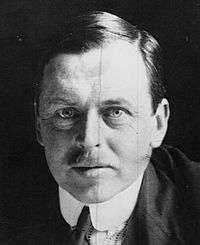 |
14 August 1931 | Conservative | Ramsay MacDonald | |||
| Sir Kingsley Wood | 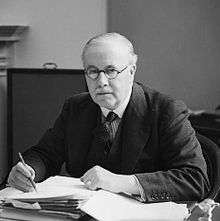 |
10 November 1931 | Conservative | ||||
| George Tryon | 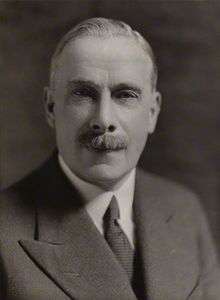 |
7 June 1935 | Conservative | Stanley Baldwin | |||
| Neville Chamberlain | |||||||
| William Morrison | 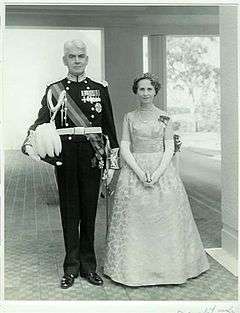 |
3 April 1940 | Conservative | ||||
| Winston Churchill | |||||||
| Harry Crookshank | 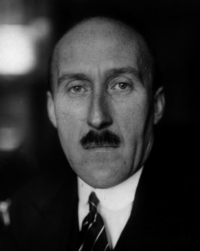 |
7 November 1943 | Conservative | ||||
| The Earl of Listowel | .svg.png) |
19 October 1945 | Labour | Clement Attlee | |||
| Wilfred Paling | 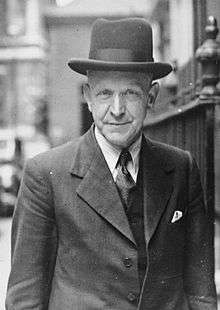 |
17 April 1947 | Labour | ||||
| Ness Edwards | .svg.png) |
28 February 1950 | Labour | ||||
| The Earl De La Warr | .svg.png) |
5 November 1951 | Conservative | Winston Churchill | |||
| Charles Hill | .svg.png) |
7 April 1955 | National Liberal | Anthony Eden | |||
| Ernest Marples | 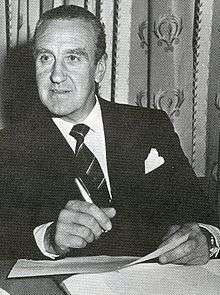 |
16 January 1957 | Conservative | Harold Macmillan | |||
| Reginald Bevins | .svg.png) |
22 October 1959 | Conservative | ||||
| Sir Alec Douglas-Home | |||||||
| Tony Benn | 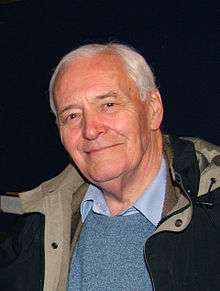 |
19 October 1964 | Labour | Harold Wilson | |||
| Edward Short | .svg.png) |
4 July 1966 | Labour | ||||
| Roy Mason | .svg.png) |
6 April 1968 | Labour | ||||
| John Stonehouse | .svg.png) |
1 July 1968 | Labour | ||||
See also
- Postmaster General (disambiguation)
- Postmasters General of Ireland
- Postmaster General for Scotland
- Postmaster and Deputy Postmaster for Canada 1763-1851 - whom reported to the Postmaster General of the United Kingdom
- Postmaster General of Canada
- Postmaster General of Hong Kong - created in 1870 to replace the Royal Mail and under British administration until 1 July 1997
References
- ↑ Brewer, J.S.; Brewer, John Sherren; Brodie, Robert Henry; Gairdner, James (1864). Letters and Papers, Foreign and Domestic, of the Reign of Henry VIII. London: Longman, Green, Longman, & Roberts. p. 1454.
- ↑ Walker (1938), p. 37
- 1 2 3 "Division No. 1 (Postal Services Bill) [15 Jun 2000] – Column 1782". Volume No. 613 – Part No. 104. Hansard. 15 Jun 2000. Retrieved 2013-08-17.
- ↑ "Manley, John (c. 1622–99)". History of Parliament Online. 2012. Retrieved 13 April 2012.
- 1 2 3 4 Falmouth packet archives accessed 9 June 2008